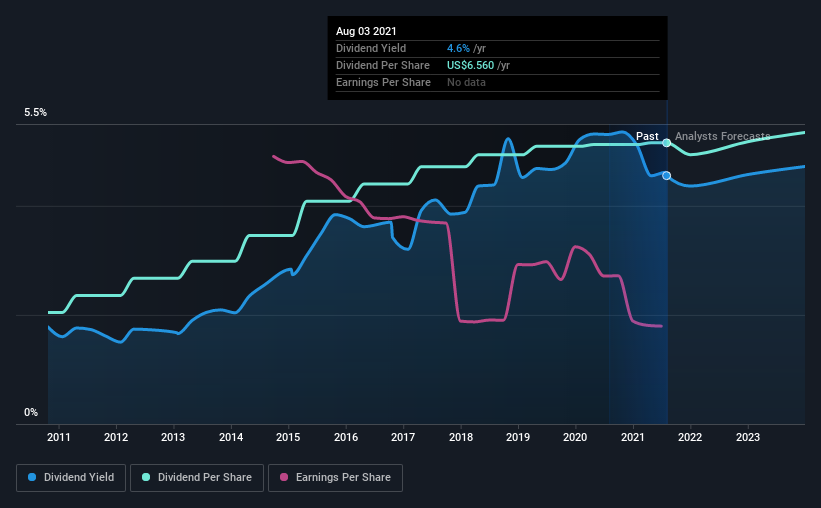We Wouldn't Be Too Quick To Buy International Business Machines Corporation (NYSE:IBM) Before It Goes Ex-Dividend
Readers hoping to buy International Business Machines Corporation (NYSE:IBM) for its dividend will need to make their move shortly, as the stock is about to trade ex-dividend. Typically, the ex-dividend date is one business day before the record date which is the date on which a company determines the shareholders eligible to receive a dividend. The ex-dividend date is important as the process of settlement involves two full business days. So if you miss that date, you would not show up on the company's books on the record date. This means that investors who purchase International Business Machines' shares on or after the 9th of August will not receive the dividend, which will be paid on the 10th of September.
The company's next dividend payment will be US$1.64 per share. Last year, in total, the company distributed US$6.56 to shareholders. Calculating the last year's worth of payments shows that International Business Machines has a trailing yield of 4.6% on the current share price of $144.07. Dividends are a major contributor to investment returns for long term holders, but only if the dividend continues to be paid. So we need to investigate whether International Business Machines can afford its dividend, and if the dividend could grow.
See our latest analysis for International Business Machines
Dividends are typically paid out of company income, so if a company pays out more than it earned, its dividend is usually at a higher risk of being cut. International Business Machines paid out 111% of profit in the past year, which we think is typically not sustainable unless there are mitigating characteristics such as unusually strong cash flow or a large cash balance. Yet cash flows are even more important than profits for assessing a dividend, so we need to see if the company generated enough cash to pay its distribution. Thankfully its dividend payments took up just 40% of the free cash flow it generated, which is a comfortable payout ratio.
It's disappointing to see that the dividend was not covered by profits, but cash is more important from a dividend sustainability perspective, and International Business Machines fortunately did generate enough cash to fund its dividend. Still, if the company repeatedly paid a dividend greater than its profits, we'd be concerned. Extraordinarily few companies are capable of persistently paying a dividend that is greater than their profits.
Click here to see the company's payout ratio, plus analyst estimates of its future dividends.
Have Earnings And Dividends Been Growing?
Businesses with shrinking earnings are tricky from a dividend perspective. Investors love dividends, so if earnings fall and the dividend is reduced, expect a stock to be sold off heavily at the same time. Readers will understand then, why we're concerned to see International Business Machines's earnings per share have dropped 16% a year over the past five years. Ultimately, when earnings per share decline, the size of the pie from which dividends can be paid, shrinks.
The main way most investors will assess a company's dividend prospects is by checking the historical rate of dividend growth. Since the start of our data, 10 years ago, International Business Machines has lifted its dividend by approximately 9.7% a year on average. That's intriguing, but the combination of growing dividends despite declining earnings can typically only be achieved by paying out a larger percentage of profits. International Business Machines is already paying out 111% of its profits, and with shrinking earnings we think it's unlikely that this dividend will grow quickly in the future.
Final Takeaway
From a dividend perspective, should investors buy or avoid International Business Machines? It's never great to see earnings per share declining, especially when a company is paying out 111% of its profit as dividends, which we feel is uncomfortably high. However, the cash payout ratio was much lower - good news from a dividend perspective - which makes us wonder why there is such a mis-match between income and cashflow. Bottom line: International Business Machines has some unfortunate characteristics that we think could lead to sub-optimal outcomes for dividend investors.
With that being said, if you're still considering International Business Machines as an investment, you'll find it beneficial to know what risks this stock is facing. Every company has risks, and we've spotted 4 warning signs for International Business Machines you should know about.
A common investment mistake is buying the first interesting stock you see. Here you can find a list of promising dividend stocks with a greater than 2% yield and an upcoming dividend.
This article by Simply Wall St is general in nature. It does not constitute a recommendation to buy or sell any stock, and does not take account of your objectives, or your financial situation. We aim to bring you long-term focused analysis driven by fundamental data. Note that our analysis may not factor in the latest price-sensitive company announcements or qualitative material. Simply Wall St has no position in any stocks mentioned.
Have feedback on this article? Concerned about the content? Get in touch with us directly. Alternatively, email editorial-team (at) simplywallst.com.

 Yahoo Finance
Yahoo Finance 
